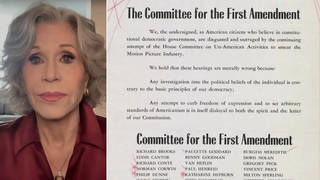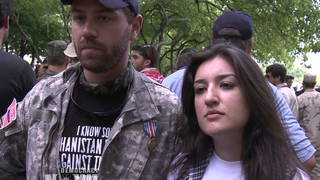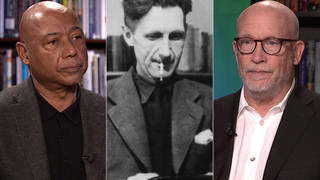
Topics
Guests
- Matthew Hohsenior fellow with the Center for International Policy.
- Ali Latififreelance journalist based in Kabul.
- Kathy Kellyco-coordinator of Voices for Creative Nonviolence.
- Hakim Youngmedical humanitarian worker in Afghanistan for over 14 years.
This weekend, President Trump publicly called off a secret meeting at Camp David with the Taliban and the president of Afghanistan that aimed to end the 18-year war, the longest in U.S. history. The United States and Taliban had appeared close to signing an agreement after holding nine rounds of talks in Doha, but the negotiations took a surprise turn when President Trump suggested a Camp David meeting that included Afghan President Ashraf Ghani, who had not been involved in the previous talks. For more, we go to Kabul to speak with Ali Latifi, a freelance journalist; Kathy Kelly, co-coordinator of Voices for Creative Nonviolence; and Dr. Hakim Young, a medical humanitarian worker. And in Washington, D.C., we speak with Matthew Hoh, a senior fellow with the Center for International Policy.
Transcript
AMY GOODMAN: We begin today’s show in Afghanistan. This weekend, President Trump publicly called off a secret meeting at Camp David with the Taliban and the president of Afghanistan that aimed to end the 18-year-war, the longest in U.S. history. Trump tweeted on Saturday, quote, “I immediately cancelled the meeting and called off peace negotiations. What kind of people would kill so many in order to seemingly strengthen their bargaining position? They didn’t, they only made it worse! If they cannot agree to a ceasefire during these very important peace talks, and would even kill 12 innocent people, then they probably don’t have the power to negotiate a meaningful agreement anyway. How many more decades are they willing to fight?” Trump asked.
The United States and Taliban had appeared close to signing an agreement after holding nine rounds of talks in Doha, but the negotiations took a surprise turn when President Trump suggested a Camp David meeting that included Afghan President Ashraf Ghani, who had not been involved in the previous talks because the Taliban refuse to meet with him. The New York Times reports Trump wanted the deal to be announced at Camp David so he would be perceived as the dealmaker who pulled the peace agreement together. But according to the Times, Taliban negotiators had agreed to come to the United States only after a deal was announced and only to meet with the American side. The New York Times reports, quote, “Trump may have canceled a meeting that the key participants were not planning to attend,” unquote.
There are also questions about the premise behind why the United States canceled the secret meeting. Trump blamed it on the recent killing of a U.S. soldier in Afghanistan, but he made no reference to the mass killings being carried out by U.S. forces. On Sunday, Secretary of State Mike Pompeo acknowledged the United States had killed more than a thousand members of the Taliban in the past 10 days, just as the two sides were close to signing a peace deal.
SECRETARY OF STATE MIKE POMPEO: There have been attacks during the talks, attacks from the Taliban on Americans and enormous attacks from American forces, putting in real pressure on the Taliban. George, we’ve, in just the last 10 days alone, killed over a thousand Taliban. We have been fighting and talking in a way that America often doesn’t do. It’s what’s driven us to be able to have the success at the negotiating table.
AMY GOODMAN: Well, for more, we go to Kabul, Afghanistan, where we’re joined by Ali Latifi, a freelance journalist. And in Washington, D.C., we’re joined by Matthew Hoh, a senior fellow with the Center for International Policy. In 2009, Matthew Hoh resigned from the State Department in protest against the Obama administration’s escalation of the war in Afghanistan.
We welcome you both to Democracy Now! Matthew Hoh, let’s begin with you. What do you understand was going to happen at Camp David, and then what President Trump called off? In fact, most people only learned there was going to be a, quote, “secret meeting” when President Trump tweeted that it had been called off.
MATTHEW HOH: Good morning, Amy. Thank you for having me on. Yeah, you know, it’s difficult to wrap your head around what’s happening, that this is the reality of U.S. politics and then its effect on the Afghan War. And it should be noted that the Afghan War, for the Afghans, isn’t 18 years old; it’s more than 40 years old. It begins in 1973, when the king was deposed — the same year I was born. So, if I was an Afghan, my whole life, I would know nothing but war or, at best, political conflict.
So, what you have now is you have the situation where it appeared that the peace talks, the peace agreement, the deal to bring U.S. forces out of Afghanistan in exchange for some limited ceasefire within the country, was predicated on Donald Trump’s desire to live up to his campaign promise to end the war and to show that he’s a better commander-in-chief, a better warmaker than, say, Bush and Obama. But the reality is, this is the most malleable president the United States has ever known. And because of what he’s seen on Fox News or what he’s read on Twitter, he now cancels these talks. He now cancels the agreement, because he’s upset because people are saying he’s weak.
And so, for me, you know, the whole idea of the showmanship of having it at Camp David and everything else, that’s secondary to what’s happening to the Afghan people. And what we’re going to see now, because — again, because of a temper tantrum by the president over what some Fox News talking head said or what some retired general said or what he read on Twitter, the Afghan people go back to basically the beginning process again, possibly, of some type of peace deal. And it’s been more than 40 years of suffering for them.
AMY GOODMAN: Ali Latifi, what is the understanding in Kabul, Afghanistan, about what was going to take place?
ALI LATIFI: [inaudible] because these negotiations haven’t been about the Afghan people. They’ve been very much about the United States and the Taliban and both of them getting what they want. And all of these meetings, these nine rounds of talks, have taken place behind closed doors in Doha, so the average person in Afghanistan has no idea. I, myself, I’m a journalist. I have very little idea. The only thing I know is, the night before, I had heard from different sources that Trump was planning to make his announcement on 9/11, which is ironic, I suppose. But for him, you know, he’s a showman, and so he wanted to put on a show, and he would have been able to do that. But the reality is, the Afghan people have never been a part of this process.
AMY GOODMAN: Can you explain what happened in Kabul last week, the suicide car bombing that killed 12 people, including a U.S. soldier?
ALI LATIFI: Right. So, the car bombing took place on the road that would lead to the entrance of where eventually you could get to the U.S. Embassy, to NATO forces and to different other sort of political and high-level buildings hidden behind massive blast walls. But that actual explosion didn’t turn — you would have to turn right to go on that road. It went straight, just a little bit forward, so it was on a highly completely civilian road. Of course, you know, there are always U.S. soldiers and forces going back and forth along that road, and, unfortunately, throughout all the roads of Kabul at any given time of the day.
But what ends up happening is, yes, this U.S. soldier got killed, but, in reality, at least 11 Afghan civilians were killed, and dozens more were injured. And this is what keeps happening. So, when Trump says that, you know, this, quote-unquote, “great, great soldier” is why he called off this talk, it kind of points to what Matthew was saying, that he must have been influenced by somebody, because this is not the first time in the last couple months that U.S. soldiers have been killed, and it’s not the first time in the nine rounds of talks that U.S. soldiers have either been killed or targeted by Taliban in their attacks.
AMY GOODMAN: On Sunday, Secretary of State Mike Pompeo acknowledged the United States had killed 1,000 Taliban in the last 10 days, just as the two sides were signing a peace deal. Ali Latifi, is this your understanding?
ALI LATIFI: This is what he says. The thing we have to remember is that — I mean, I’ve been seeing these reports since at least 2011 from the Afghan government, and now apparently from the U.S. government, every day, saying, “We killed 60 Talibs,” or “We killed 50 Talibs,” or “We killed 10 Talibs,” or “We killed militants,” or “We killed Daesh.” And those are very hard facts to prove. Those are very difficult things to prove because these operations take place usually at night, they take place in remote areas, they take place in areas where the press and rights workers usually don’t have access, where the government doesn’t generally go to follow up on these things. So, it’s very difficult. He can say that he killed a thousand Taliban, but what does that really mean? Who were they? And even if they were Taliban, a thousand Taliban, the province of Kunduz nearly fell — what was it? about two weeks ago? — again, for the third time. And then the province of Farah on the west also came under heavy attack. Next door to Kunduz, Baghlan came under heavy attack. So, if you’re killing a thousand Taliban, what does that really say, if you are indeed killing a thousand Taliban?
AMY GOODMAN: We’re going break and then come back to this discussion. We’re talking to Ali Latifi in Kabul, Afghanistan. We’re talking to Matthew Hoh at the Center for International Policy in Washington, D.C. And we’ll be joined by two peace activists, an American and an Afghan leader, Kathy Kelly, co-coordinator of Voices for Creative Nonviolence, as well as Dr. Hakim Young, a medical humanitarian worker who has worked in Afghanistan for more than 14 years. Stay with us.
[break]
AMY GOODMAN: “Mr. Tambourine Man” by Bob Dylan. This is Democracy Now!, democracynow.org, The War and Peace Report. I’m Amy Goodman. As we continue our coverage of Afghanistan, we’re joined by two more guests in Kabul: Kathy Kelly, co-coordinator of Voices for Creative Nonviolence, a campaign to end U.S. military and economic warfare, and Dr. Hakim Young, medical humanitarian worker who’s worked in Afghanistan for more than 14 years.
Kathy Kelly, we first learned of the news of a, quote, “secret,” as President Trump described it, Camp David meeting, that would be the leaders of the Taliban, the Afghan President Ashraf Ghani and President Trump, though all of this is being called into question right now, whether all of these people were going to be at Camp David, but now Trump has called it off. Your thoughts as both Democrats, a number of Democrats, joined with Republicans in condemning the meeting, saying that it is an outrage that it’s happening at all, let alone the week of 9/11, the anniversary of the September 11th attacks?
KATHY KELLY: Well, Amy, I think that the outrage that should be felt, most appropriately, the outrage over the idea that warlords, multiple warlords, including the United States military authorities and anybody representing the U.S. government, have been negotiating a peace deal. And it’s a charade. I mean, we’ve seen how many people have been killed as leverage. Killing human beings has been leverage during these peace talks. And I highly doubt that the majority of Afghanistan’s people, who are women and children, are being well represented in the so-called dialogue.
AMY GOODMAN: Can you explain what you understand, Kathy Kelly, these peace talks have been about, that have taken place in Doha?
KATHY KELLY: Well, they’re highly secretive, but it does seem that Zalmay Khalilzad has already dropped two of the demands that the United States was going to make, which had something to do with the Afghan government. Again, I want to say that these are warlords that we’re talking about, those within the Taliban, and the many groups that comprise the Taliban, and the Afghan government. But the Afghan government clearly won’t be included in the deal that they were talking about making. I think a ceasefire is something that is even further on down the line, should it even be called for.
AMY GOODMAN: And, Dr. Hakim Young, your response, working in Afghanistan for the past 14 years, to this news that has taken place? First we learned that there was going to be a secret meeting. Then Trump was calling it off. Unclear that — what the explanation, that also Ashraf Ghani was going to be there, considering that he has not been a part of the peace talks because the Taliban refuse to negotiate with him.
DR. HAKIM YOUNG: Thank you, Amy, for having me. Like Greta Thunberg had said regarding the climate crisis we have in the world, in the past 14 years I’ve seen how this crisis in Afghanistan, in the war, means that there is — seems to show that there’s no current political system anywhere that can really hold genuine peace negotiations. I mean, these current peace negotiations, to me, are not genuine peace negotiations, because Afghans are not involved. The warring parties are all equally complicit in the killing. They want to fight and talk at the same time, which doesn’t work. And the Taliban in Doha are not representative of either the Afghan people or even of the Taliban.
AMY GOODMAN: Ali Latifi, in Kabul, as well, can you explain what the points were in these negotiations, and also the significance of the Afghan government, the president, Ashraf Ghani, not being included in these negotiations?
ALI LATIFI: Well, I think the significance of President Ghani not being included is — it’s great, it’s huge, because at the end of the day, you know, he is the representation of the Afghan people on a political sense. He is the president of the country. I remember, in an interview earlier this year, he said of Zalmay Khalilzad, who grew up with him in Kabul, who went to Beirut with him to study — you know, he said, “Dr. Khalilzad is an American, and I’m the president of 32 million Afghan people.” And yet he’s not included, but Zalmay Khalilzad, who worked for Bush, you know, who was his ambassador to Afghanistan and to Iraq during the occupation of Iraq, is there, and then the only Afghans present are the Taliban. So this is a big, huge deal.
As to what’s being negotiated, we keep hearing two points, two points that only serve the interests of Washington and the Taliban. Washington’s interest is this claim that the Taliban can no longer house or support, quote-unquote, “foreign terrorist groups,” including al-Qaeda, which it hasn’t been able to do in 18 years, which it won’t be able to do and which it genuinely has no interest in, as far as you can tell. I mean, even when they claim to target U.S. soldiers and U.S. forces, what ends up happening is that it’s the Afghan people who continue to die. They’re saying they’re fighting an occupation, but they’re continuing to kill our own people. And then, for the Taliban, they’re getting what they want in the sense that the U.S. is going to agree to some kind of a troop pullout.
And that’s really all we know. Everything else is done behind closed doors. Everything else is secretive. We know that the president got a copy of the agreement in principle signed between Khalilzad and the Taliban, which had to be approved by Trump, and he had questions about the wording and about the specifics. We know that his chief executive got a copy of it. But other than that, the average Afghan has no idea what would have been in that — any sort of document or agreement.
AMY GOODMAN: Matthew Hoh, in Washington, D.C., you worked in the State Department in Afghanistan. Ten years ago, you resigned. You’re now with the Center for International Policy. Can you talk about what you think the mistakes of the Obama and then Trump administration have been, what you understand is being negotiated, how can it be negotiated without the Afghan president to be successful, and, finally, now this pile-on by Democrats, as well as Republicans, outraged that any deal would be signed, or, more importantly, that Taliban would step foot on U.S. soil, and again, the emphasis they’re making right now, this week of September 11th, the anniversary of the attacks in 2001?
MATTHEW HOH: You know, I was just thinking, Amy, I recall eight years ago being here in this same exact little studio talking to you about the death of bin Laden. I think you have to go further back to understand what’s happening with the United States, why the Democrats are piling on, as you said, against any type of peace deal, against any type of withdrawal of American forces. You have to go back to 1947 and the National Security Act that President Truman puts in place, that creates this permanent warmaking establishment within the United States government, that makes the priority of the United States government war.
And so, I think that’s what you see here when you see any semblance of a deal. And I agree with everyone in Kabul, who know certainly better than I do — I’m sitting here in D.C. drinking a cup of coffee, you know, I mean — that the United States government is not to be trusted in these issues. The United States government started funding the war in Afghanistan months before the Soviet Union invaded in 1979. They wanted to bring about the Soviets into a trap to create the Soviets their own Vietnam. When the Soviets leave in 1989, the United States government keeps funding the various mujahideen groups, and the fighting continues. So, the United States has been culpable in the violence that has beset and just besieged the Afghan people for more than four decades now. So, I think that it’s hard for the United States, one, to take responsibility of it. You won’t hear this kind of conversation within corporate media. You won’t hear this conversation within — from politicians. You certainly won’t hear this conversation from the retired generals, who are the talking heads, who are all being funded by the defense industry.
And so, I think for the United States, our perspective is we have to take a step back and look at the bigger picture. I mean, since 9/11, we don’t even know how many places we have sent young people to kill other people and be killed themselves. The estimates are between 15 and 22 countries the United States has waged war in since 2001. So, for the United States, what’s happening in Afghanistan is something that we just shrug and move on with the next news cycle for, or wait for President Trump to have another temper tantrum about, but there’s hardly any conversation about the Afghan people.
And so, just to wrap up my little piece here, the points being made in Kabul are exact and correct, that the United States has been a belligerent, the United States is not to be trusted. And what I would hope for the Afghan people in the next presidential elections, hopefully in the next month or so, that the victor in that contest proceeds without the United States, without foreign powers, and tries to find a solution for the Afghan people, because the only solution for this war is going to come from the Afghan people themselves.
AMY GOODMAN: Ali Latifi, before we lose you, lose the satellite in Kabul, you’re a freelance journalist. What are the conditions on the ground right now? And you’re in Kabul. And who are the Taliban leaders who supposedly were going to go to Camp David? And do you understand all the talks are being derailed altogether? And do people in Afghanistan even understand talks were underway and who were the parties to these talks?
ALI LATIFI: Everyone knows that talks are underway. They had some [inaudible] you know, was party to these talks. Essentially, the parties still come down to the idea that it’s the United States and the Taliban. And one thing we have to remember is that, in general, the feeling was that this was going to be a bad deal, that this was not a deal for the Afghan people in any way. Obviously, the way Trump went about it, the way Democrats and Republicans are arguing about it, is very detached from reality. But the reality on the ground is that most people felt like this would have been a bad deal anyways. Obviously, a deal needs to be made, but the question is always how is a deal being made, who is being involved and what is being discussed. And as long as these deals are being made in foreign capitals behind closed doors, without — you know, I say even if the Afghan government gets involved, it’s still not enough. You still need — there’s 32 million people that will suffer the consequences or see the benefits of whatever agreement is made.
So you still need to make sure that there are young people involved, that there are women involved, that there are different ethnicities involved, that there are different religious sects involved, that everybody has some kind of a say in these negotiations. These kinds of negotiations need to happen, because it’s become very clear that this war won’t be won on the battlefield. But they need to happen in a proper way, right? They need to happen correctly. Right now there are a lot of supporters of the president and this government very happy that this deal went down in flames, because it ensures that an election will happen, which they feel like they’ll win. But it kind of — it hinges on this assumption that this war can be won on the battlefield, which, again, we’ve proven, time and time again, unfortunately, is not true. A deal has to be made, but it can’t be just any deal, as well.
AMY GOODMAN: Kathy Kelly, you are a longtime peace activist on the ground. You have spent — gone to Afghanistan countless times, where you are right now. What is the understanding of peace activists on the ground? What are they calling for? And also, in the last days, the reports we had, The New York Times reporting the White House was seriously considering expanding the CIA’s presence in Afghanistan, if and when international forces begin to leave the country, U.S. forces. As senior White House advisers seeking to expand the CIA’s presence, the CIA presence would include the creation of new counterterrorism militia forces, but the CIA Director Gina Haspel reportedly has raised concerns about the idea. The Taliban has said the CIA must also leave Afghanistan along with the military.
KATHY KELLY: Well, and we might add also that since President Trump took office, there’s been a 65% increase in private security contractors in Afghanistan, being paid by the United States. There’s a lot of skepticism on the part of young peace activists whom I know. They don’t any longer expect that negotiators are going to help them have a more secure future. They tell us about others in their classes who can’t possibly find jobs, and so, for the sake of an income, enlist in one militia or another. And they now even begin to wonder themselves if their own fellow students will begin to urge taking up weapons. But I’ve been impressed by the commitment to try to solve problems without resorting to war on the part of people who are living in a war-torn area and have been deeply traumatized by events of the past year. So many of them have their own friends now only as memories. The loss of life has been staggering. So, I don’t think that the United States is showing much concern for people on the verge of civil war because of the possible consequences of the dealmaking. You know, the United States, in 2018, sent 123 million bullets to Afghanistan, and that was an eightfold rise over the number of bullets sent in 2017. And what does that say about a concern to preserve life and help people survive these times?
AMY GOODMAN: And finally, Dr. Hakim Young, explain why you came to Afghanistan 14 years ago as a medical humanitarian worker and what you think this all means. Will this derail all talks, or will it simply be that people don’t come to the United — the Taliban don’t come to the United States, but the talks continue in Doha or other places?
DR. HAKIM YOUNG: Thank you. I came to Afghanistan for the purpose of trying to help in the medical health services, as we know the medical humanitarian situation in Afghanistan has always been a challenging one, a crisis.
With the talks, maybe I can describe it by using an analogy. We have 32 million ordinary Afghans here in this country. The United States has population of about 320 million ordinary Americans. If the United States had a militant, religiously motivated group within the United States that are killing Americans, and the United States government asked the U.K. government to help them fight these militants, what the peace deals today are like would be like the U.K. government now inviting the militant, religiously motivated militants in the U.S. to London to talk about making a peace deal over 320 million ordinary Americans. So it’s preposterous. It’s theater. It is a show. It is what Afghans say is a game. So, I think that such a nature of peace deals should really be suspended for genuine peace negotiations.
AMY GOODMAN: We’re going to leave it there for now, but of course we will continue — were you just saying something, Kathy?
KATHY KELLY: No. Thanks, Amy. Thanks very much for including us.
AMY GOODMAN: Dr. Hakim Young, medical humanitarian worker who’s worked in Afghanistan for more than 14 years. Matthew Hoh, in Washington, D.C., senior fellow for the Center for International Policy, resigned 10 years ago in protest of the Obama administration’s escalation of the war in Afghanistan. Ali Latifi, in Kabul, Afghanistan, freelance journalist. And Kathy Kelly, also there in the capital of Afghanistan, co-coordinator of Voices for Creative Nonviolence, a campaign to end U.S. military and economic warfare.
Coming up, as the death toll from Hurricane Dorian continues to rise in the Bahamas, we look at how major TV networks ignore the connection between the deadly storm and climate change. But first we’ll go to Tennessee, where ICE agent killed an — where an ICE agent shot an undocumented immigrant in a Tennessee parking lot. Stay with us.













Media Options